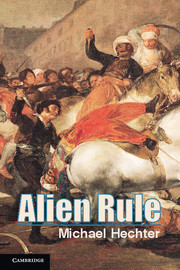Book contents
- Frontmatter
- Book part
- Contents
- List of Figures and Photographs
- Preface
- 1 Introduction
- 2 Alien Rule and Its Discontents
- 3 The Failure of Legitimate Rule in Iraq
- 4 Resistance to Alien Rule in Taiwan and Korea
- 5 Dynamics of Military Occupation
- 6 Academic Receivership as Alien Rule
- 7 Conclusion
- Bibliography
- Index
7 - Conclusion
Published online by Cambridge University Press: 05 June 2014
- Frontmatter
- Book part
- Contents
- List of Figures and Photographs
- Preface
- 1 Introduction
- 2 Alien Rule and Its Discontents
- 3 The Failure of Legitimate Rule in Iraq
- 4 Resistance to Alien Rule in Taiwan and Korea
- 5 Dynamics of Military Occupation
- 6 Academic Receivership as Alien Rule
- 7 Conclusion
- Bibliography
- Index
Summary
All great truths begin as blasphemies.
– George Bernard ShawAs a form of governance, alien rule is at least as old as the longest-lived empire, in ancient Egypt. Beginning in the seventeenth century, classical liberalism’s emphasis on the sovereignty of the individual – and the right of individuals to self-determination – began to subvert the legitimacy of alien rule. At least since the American and French revolutions, the scope of this right has been expanded to apply to entire societies: the norm of national self-determination has flourished across the globe.
The track record of alien rulers often has been lamentable. Too frequently, the motives behind its imposition are exploitative. Colonialism developed not to bring civilization to the benighted populations of the Third World but rather largely because metropoles sought markets, labor, and primary products for their own domestic ends. Likewise, dominant powers typically occupy the territory of defeated enemies solely for their own strategic and economic benefit. Because these powers are not in it for the long haul – apart from seeking a certain modicum of social order that is required to efficiently exploit the territory – there is little point in investing in the kind of governance that might curry favor with the populace. To the degree that rule is instituted for exploitative ends, alien rulers and their regimes will not attain legitimacy. Rather, at some point they will suffer anti-regime, often nationalist, resistance. Likewise, when alien rule following military conquest damages or destroys a country’s infrastructure, as occurred during the American invasion of Iraq, the probability of resistance and civil war increases (Peic and Reiter 2011). For these reasons, alien rule has come to be regarded as a blasphemy that is a relic of the past.
- Type
- Chapter
- Information
- Alien Rule , pp. 138 - 158Publisher: Cambridge University PressPrint publication year: 2013



